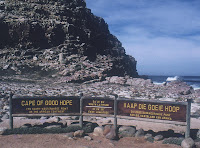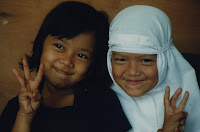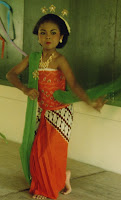 Rosinha formed a triptych in my life and these writings; faceted with a captivating romance in Rosinha de Brasil, the mysterious loss in Rosinha and Estrangeiro Permanente, and now a resolution. Someone said, “It is better to have loved than never…
Rosinha formed a triptych in my life and these writings; faceted with a captivating romance in Rosinha de Brasil, the mysterious loss in Rosinha and Estrangeiro Permanente, and now a resolution. Someone said, “It is better to have loved than never…My István Zolcsák blog from May 13, 2007 dealt with my reunion in Brasil after a twenty-five year absence. An omission from that entry was the search for Rosinha. A romantic spark ignited in Finadi’s son Pascoal when I told him pieces of the old story. He insisted we could find Rosinha. I was prepared with her old address and family photos taken at a Christmas dinner long ago. We found her old house vacant but occupied by vagrants. A sign near the entrance said it was scheduled for demolition in a few months. Some adjacent residents were not helpful till we found an older gent that remembered Rosinha. He sent us up the road to another gent who sent us to a lady. She knew Rosinha’s sister that lived several blocks away but did not know the house. We continued on foot and inquired at a local bar just two doors away from the sister. Home security was essential in São Paulo nowadays. Gaining her attention through an iron date, she was not accommodating until I held out the Christmas pictures. Yet she failed to give us any direct information. We gave her Pascoal’s mobile phone number, she said that she would contact Rosinha, and have Rosa call us. Pascoal and I were pleased at our limited success and stopped back at the local bar to have a celebratory cervesa – within five minutes the sister called to say Rosa was coming to her house. We clinked our glasses and gulped the beer. The twenty minute wait left me unsure that I wanted to resolve the mystery.
Rosinha was her radiant self and obviously the wrinkles were to be expected. She was coy and I held back too waiting for her to open up. We conversed in Portuguese at her sister's house for about forty-five minutes, mostly about the family in my pictures. Rosinha drove us back to the car. A little more talk and she started using English. We left without a firm commitment to meet again – only to call the next day. I was satisfied and comfortable about our first meeting despite the lack of results. Pascoal took me to a nice pub for a Beirut sandwich and a chopp (draft beer) for a better celebration. While there, Rosa called his cell and confirmed I should call her in the morning. This made for better results. Pascoal enjoyed telling our detective story on our return to the house.On Sunday, I called Rosinha. She was surrounded by what she said were three dogs and two cats. This, I would not have expected of her. She admitted to the fear of being found by former Enco people and the Zolcsák’s and therefore would not come to a planned Finardi family outing.
Monday was an official holiday, but with a bit of a cold I lacked the ambition to do much. Odete and I took a long walk and hit the Sé supermarcado. As promised, I called Rosa and she asked to see me. With apprehension I agreed to take a taxi to Avenida Brasil and Avenida Reboucas. She picked me up there. We stopped for an ice cream and she asked about how and why I was married and divorced. She claimed her story was too complicated. She drove us to her house and the story unfolded. The awaited answers came out but little did it matter. History has its relevance but did not change the circumstance we were in that day. So long ago, when I opted to delay my return for Africa, she sought consolation from our magnanimous Mr. István (Steve) Zolscák, and their affair ensued. My eventual return left me estranged. Rosinha had a daughter Lynda through an unwedded union with Steve after his divorce. The more the details unfolded, the less I cared. I was feeling apprehensive about being there and when she asked if I wanted to rest I laid back on the couch for thirty minutes. I awoke and went to the kitchen. We embraced. I tried to explain the similarity in now and the last time we held each other at the Pampas Palace Hotel twenty-five years ago. I wanted no part of it.
She dropped me at a taxi stand and I returned to the Finardi’s. Odete asked, I said, I could not return after 25 years, she was happy with that decision.


















































